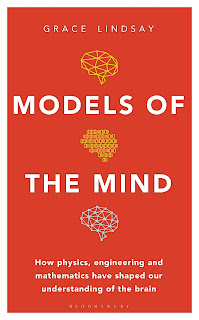Grace Lindsay is careful to emphasise the very real difference between physical and biological problems. Most systems studied by physics are a lot simpler than biological systems, making it easier to make effective mathematical and computational models. But despite this, huge progress has been made drawing on tools and techniques developed for physics and computing to get a better picture of the mechanisms of the brain.
In the book we see this from two directions - it's primarily about modelling the brain's processes and structures, but we also see how the field of artificial intelligence has learned a lot from what we know of the way the brain works (and doesn't work very well) in developing the latest generation of AI systems. Lindsay shows how we have come to get a better understanding of the mechanisms of neutrons, memory formation, sight, decision making and more, looking at both the detailed level of neurons and larger scale structure. Many of the chapters take us on entertaining diversions related to the history of the development of these ideas. When I mentioned the book to someone who works in neurology, the response was that most computational neurology books they'd come across contained a barrage of equations - Lindsay does this with hardly an equation in the text (the only one I remember is Bayes theorem), though there are a few in an appendix for those who like their content a bit crunchier.
The only real criticism I have is that it could have done with some paring back. The book felt a bit too long, too many people were name-checked, and too many bits of brain functionality were covered. I also wouldn't have finished the book with a 'grand unified theories of the brain' chapter, which had too much of an overview feel and threw in concepts like consciousness that require whole books in their own right - it would have been better if the last chapter had pulled things together and looked forward to the next developments. However, this remains an excellent introduction to an area that few of us probably know anything about, and all the more fascinating because of that.
| Hardback: |
| Bookshop.org |




Comments
Post a Comment